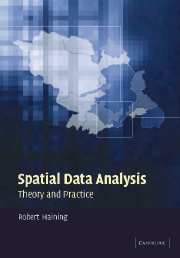Book contents
- Frontmatter
- Contents
- Preface
- Acknowledgements
- Introduction
- Part A The context for spatial data analysis
- Part B Spatial data: obtaining data and quality issues
- 3 Obtaining spatial data through sampling
- 4 Data quality: implications for spatial data analysis
- Part C The exploratory analysis of spatial data
- Part D Hypothesis testing and spatial autocorrelation
- Part E Modelling spatial data
- Appendix I Software
- Appendix II Cambridgeshire lung cancer data
- Appendix III Sheffield burglary data
- Appendix IV Children excluded from school: Sheffield
- References
- Index
4 - Data quality: implications for spatial data analysis
Published online by Cambridge University Press: 06 July 2010
- Frontmatter
- Contents
- Preface
- Acknowledgements
- Introduction
- Part A The context for spatial data analysis
- Part B Spatial data: obtaining data and quality issues
- 3 Obtaining spatial data through sampling
- 4 Data quality: implications for spatial data analysis
- Part C The exploratory analysis of spatial data
- Part D Hypothesis testing and spatial autocorrelation
- Part E Modelling spatial data
- Appendix I Software
- Appendix II Cambridgeshire lung cancer data
- Appendix III Sheffield burglary data
- Appendix IV Children excluded from school: Sheffield
- References
- Index
Summary
This chapter is concerned with examining the implications of different aspects of data quality for the conduct of spatial data analysis. It was noted at the end of chapter 2 how particular aspects of data quality may have an impact on particular stages of spatial data analysis. Whilst some quality issues impact on the data collection and data preparation stages prior to undertaking analysis, other quality issues impact more on the form and conduct of the statistical analysis or on how results can be interpreted.
The first section deals with error models and the implications of different types of error for data analysis. Section 4.2 considers various problems associated with the spatial resolution of data. The problems discussed include: the impact of varying levels of precision across a map divided into areas; the change of support problem (moving from one spatial framework to another); the problems associated with ecological analyses including aggregation bias and the modifiable areal units problem. Sections 4.3 and 4.4 deal with consistency and completeness problems which include the missing data problem. Some of the results in these later sections use data models which are discussed in chapter 9.
Errors in data and spatial data analysis
Models for measurement error
All data contain error as a consequence of the inaccuracies inherent in the process of taking measurements. Error models are important in data analysis. An error model allows quantification of the probability that the true value lies within a given range of the measured value.
- Type
- Chapter
- Information
- Spatial Data AnalysisTheory and Practice, pp. 116 - 178Publisher: Cambridge University PressPrint publication year: 2003
- 1
- Cited by



